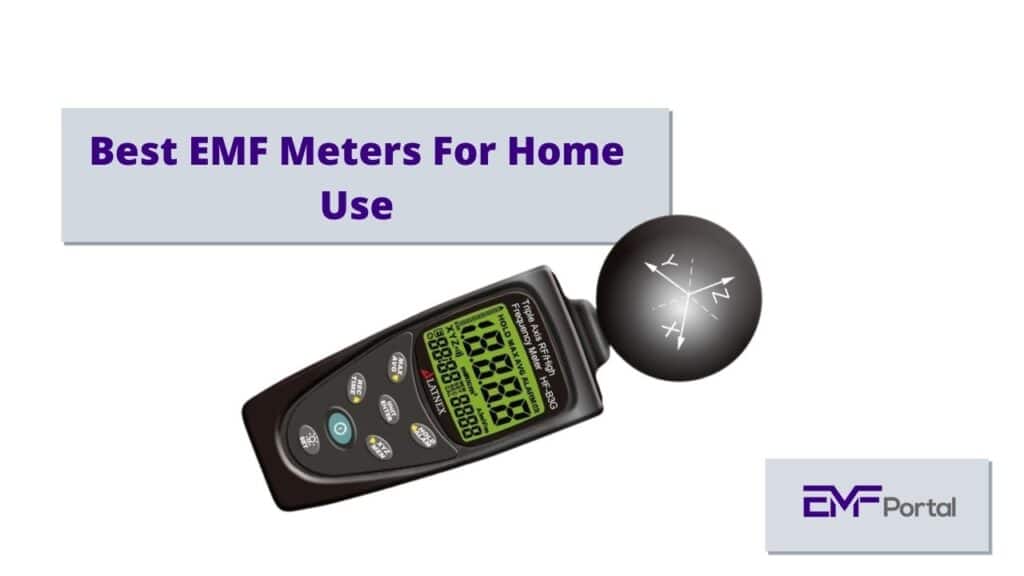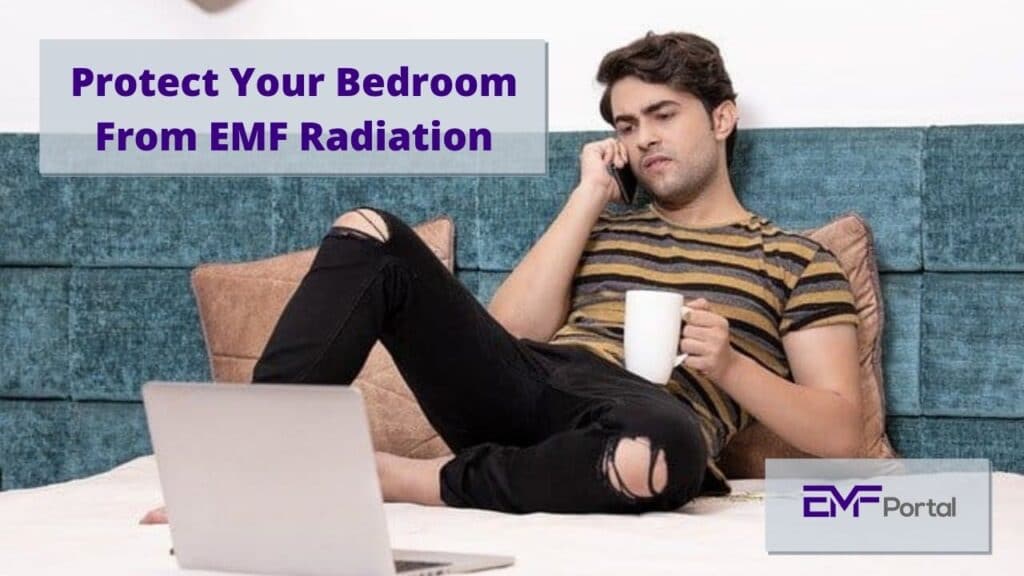
So what is the best EMF meters for home use? The quick answer is:
- Trifield TF2.
- Cornet ED88T EMF Meter.
- Acoustimeter AM-10 RF Meter.
- Latnex HF-B3G Radio Frequency Meter.
If you’ve read any of my other articles, I almost always endorse getting a good EMF meter if you’re concerned about radiation. If you are here, I am assuming that you already are aware of EMF radiation and the underlying risk it poses to our health and general wellbeing.
We are bombarded all the time with radiation, be it from your smartphone or your laptop or TV. With that understanding, it is absolutely crucial to invest in a good quality EMF meter that is easy, accurate and can measure all sorts of radiation.
In this guide, we will talk about why EMF meters are such valuable assets, touch upon the specific things you should look out for when buying one for yourself, and finally, recommend our top five EMF meters that are available online now.
Why do I need to get an EMF meter?
EMF meters may seem to be unnecessary at first but once you really understand the true depth of damage that long-term radiation exposure can cause, the more getting an EMF meter will make sense.
Good EMF meters can not only help you understand the kinds of radiation that your home is flooded with but also the amount of it. I run this website with the goal of putting together a comprehensive guide that helps people understand and fight back against EMF radiation in their homes.
My articles cover a range of topics that give readers insight into the radiation levels at their homes and how to reduce it but those tips and tricks mean nothing if you don’t have a quantifiable way of measuring if they are really working.
If you wanted to reduce EMF radiation in your home and applied my recommended steps in your environment, without an EMF meter it would be really difficult to tell how much radiation was actually reduced.
Also, EMF meters come equipped with hardware that can detect any type of EMF radiation. This allows you to easily scan your home for radiation, apply the fixes and then rescanning to see if the fixes are working. EMF meters are also excellent testers for EMF protection items.
Things like EMF blankets and cellphone cases can be tested for their veracity of claims by simply measuring how much radiation they allow to dissipate onto your environment. There are plenty of other use cases for EMF meters that make it a must-buy for anyone serious about EMF radiation.
Honestly, if you don’t have one by now, you have no idea what you’re missing out on. This will be your best companion in your quest to reduce EMF radiation from your home.
What should I be looking out for when buying an EMF meter?
Buying your first EMF meter can be confusing, which is why I have compiled a checklist of items you need to consider before deciding on the one you want to buy.
Accuracy
The EMF meter needs to be accurate all of the time. Now, no meter can give you 100% accurate measurements because that’s just the way real life is.
However, what you want to look out for is a margin of error that is less than 5%. Anything above 5% and things can get a little tricky, especially with shorter wavelength radiation.
If you’re not going for the absolute dirt cheap meter available, most decent ones have their margins below 5%, making them safe to buy. All of our recommendations too are below the 5% threshold.
Versatility
You should buy a meter that measures all radiation types. There are several out there with a lower price tag that only measures EMF radiation. Those are bad investments in my opinion since you want your meter to be as versatile as possible. Also, when you’re scanning, you’d want to know of all radiation that is present in your house.
If you have very little EMF radiation but a very high degree of microwave radiation, those meters will fail to detect it, thus generating inaccurate reports. Get one that can measure all radiation so that you really get a bang for your buck.
Cost
Cost is an important factor to keep in mind. While there is no reason why you should spend extravagant amounts of money to get industrial-grade EMF meters, you shouldn’t go for the cheapest ones either.
A lot of them are inaccurate, have no quality control, and are just unable to measure all types of radiation. Investing your money into one that will yield consistent accurate results as well as be able to measure all ranges of radiation is ideal.
Ease of use
This is a big one for most first-time buyers. Getting a meter that is simple and easy to use can do a world of good to newbies who’re still experimenting.
You shouldn’t have to have technical knowledge in order to use your meter and you should always choose one that has a simplistic interface with an intuitive design.
Features
Your EMF meter can come with additional features such as memory storage to store your readings and full digital reading clusters. As you might have guessed, the more features your meter has, the more it will cost.
The important thing here is to strike a balance. You don’t want features that are excessive in nature and purely there for cosmetic reasons. Buy one that has all the important ones you need and you’ll be fine.
Here are the best EMF meters for home use
Trifield TF2

The Trifield TF2 is an absolute winner in terms of the functionality and features it offers.
It succeeds in the widely popular 100XE model and is an essential upgrade to the former’s hardware. The Trifield TF2 comes with a digital display and a host of other new features that give the needed touch of modernization to an already fantastic EMF meter.
The Trifield TF2 can be used to measure all kinds of radiation frequencies including magnetic, radio, and microwave.
The meter comes with a three axial sensor for increased magnetic sensitivity so that you get accurate readings regardless of the direction your meter is pointed towards.
It also ships with a weighted radiation mode standard that allows you to measure the amount of radiation that is interacting with a human body at any given time.
It has a lot of really cool functions but the cherry on the top really is the audio feedback system that helps you hear the EMF radiation around you, thus allowing you to isolate specific places and gadgets that emit the most radiation. The meter is built to last and the hundreds of reviews on Amazon are a testament to their amazing build quality.
They are really easy to operate, no matter if you are a beginner or a pro. They are priced very competitively and for the features that they offer, it is a bargain. This is a product I cannot recommend enough. Here is a link for it on Amazon you can find the latest price here.
Cornet ED88T EMF Meter

The Cornet ED88T is one of the most exciting EMF meters on the market today and for good reason. It comes loaded with features, is competitively priced and is overall a quality meter that will leave its user happy every time.
It does a wonderful job of measuring all kinds of radiation and has a really fine-tuned sensitivity that picks up even the faintest of frequencies. Like the Trifield TF2, it also features an audio feedback system which is handy in isolating places from where the radiation originates.
But the best feature of all, which sets the Cornet ED88T apart is the reading history feature that lets users go back and browse through the list of the last 30 readings taken by the machine. The history is auto-saved onto memory and upon exceeding 30, the older ones are simply written over.
The only issue with the Cornet ED88T that I found was its design. While it looks neat with only a handful of buttons, it wasn’t programmed to be an intuitive system. I found the first few days on the Cornet ED88T to be confusing and had to fiddle around quite a bit before finally getting the hang of things.
It’s not a major deal and the meter is still a very good one but be aware that if you are getting this one, it does have a learning curve. Find the latest price on Amazon here.
Acoustimeter AM RF Meter

The Acoustimeter is perhaps the best RF meter available right now on the market. It is universally praised for its sensitivity and accuracy, is super simple to use and is loved by novices and professionals alike.
However, the biggest drawback of the Acoustimeter is that it can only read RF readings. The Acoustimeter does not have the capability to read electrical field radiation or magnetic radiation.
Perhaps you can use this to pair with your Meterk EMF Detector from the last listing to complete the trio but if you are looking for an RF meter that is extremely accurate with a simple user interface, the Acoustimeter is perfect for you. The sensitivity of this meter is seriously stunning which is probably why most professionals choose the Acoustimeter for their RF reading needs.
It can pick up even the faintest of frequencies and display them for you. But more importantly, it has an amazing directional sensor that allows you to precisely pinpoint the location from which the radiation is emanating,
Although it is a very appealing EMF meter, it does come with its fair share of drawbacks. The first thing is its cost. With a sticker price of almost double that of the TF2, this is one of the most expensive meters on the market today. Couple that with the fact that it is only limited to measuring RF radiation and the appeal goes down even further.
However, if you need a meter that measures RF radiation with pinpoint accuracy, this is the one you’d want to get. Again the best price comes from Amazon. Find the latest price and customer reviews here.
Latnex HF-B3G Radio Frequency Meter

The Latex EMF meter is quite similar to our Acoustimeter in that this too is limited to measuring RF radiation, however, it does so at half the price while keeping up the great quality.
It has a tri-axial radiation detection sensor that accurately determines the direction from which the EMF is emanating and it features a simplistic, beginner-friendly design that is easy to use.
Added to that, it comes with a detailed manual that lays out what the instrument can do and how you can get optimal performance out of it.
This is great for beginners since the included literature is a handy reference that they can just read through if things seem too confusing.
Although it is marketed to be a budget-friendly alternative to the Acoustimeter, it still is quite high for the features it offers. Priced similar to the TF2, it misses out on key features and doesn’t look like an exciting buy when compared head-to-head with the latter.
It’s a good product if you are looking for an RF meter but don’t want to pay Acoustimeter prices, however, there are several other products available that will give you a better bang for your buck overall. Find it on Amazon here.
Should I get a digital EMF meter or an analog one?
Truth be told, it doesn’t make a difference. All you really have to look for is the features it offers and the overall build of the meter.
However, it is undeniable that digital display clusters do have a greater appeal because of the ability to stack more information onto the screen and the backlight that enables the meter to be used in low-lit environments without any trouble.
Personally, I would choose a digital meter but if you found an analog meter that is good and gets the job done, go for it.
For more articles on home protection visit the links below
- How To Protect Your Bedroom From EMF Radiation
- Protecting Your Home From EMF Radiation
- How To Protect Yourself From Dirty Electricity
- Reducing EMF Radiation In Your Kitchen


